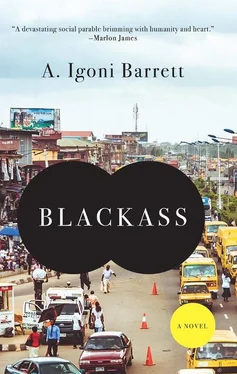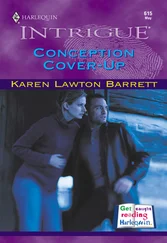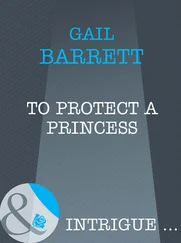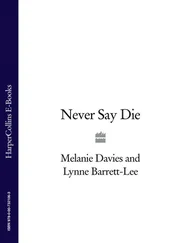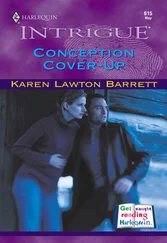Late afternoon, the red-faced sun slinking off west: offices shut and the shops shutting, the traffic hawkers multiplied in the frenzy of the day’s dying, the motorways choked with cars and the sidewalks with crowds, the zombie drag of feet drumming the earth. As Furo wondered where to go, he wandered around Ikeja, caught in this surge, the headlong rush of Lagos at the end of day. Inside and outside, from the pull of his thoughts to the push of his surroundings, nowhere was there respite from the muddle of images, sounds, smells.
Inside, he thought:
The streets of Lagos at night were dangerous for anybody, more so for him; and sleeping on the streets was an option only for the insane, the gang-affiliated, or the suicidal.
Outside, he saw:
Surly faces, ferocious stares, armies of swinging legs — a burst pipe in a roadside gutter. It spouted water in a fine spray, the ground for metres around churned into mud by feet.
He thought:
He couldn’t afford a hotel, and police stations were to be avoided. He would most likely be arrested as a foreigner with no papers.
He saw:
Splotches of faeces lining the ground beside a flyover whose concrete sides were plastered with posters of pastors and politicians; and, under the bridge, littered around, their edges fluttered by the draughts from passing cars, were torn newspaper pages, crumpled notebook sheets, discarded lottery tickets, streamers of tissue paper, all stained with shit.
Inside:
He was sure he could find a church, they were scattered around all corners of Lagos, but finding one that left its doors open at night was another matter. Even churches had learned the hard way that robbers in Lagos had no fear of the Lord.
Outside:
Hills of festering garbage at street corners, and mounds of blackish sludge along the edges of gutters from which they were shovelled out, and everywhere rubbish — punctured plastic, shattered glass, mangled metal, rain-pulped paper — covered the ground.
Furo thought: There is nowhere to go.
Near the end of a deserted street Furo had turned into to get reprieve from the stares and the noise, he saw a three-storey apartment block with a collapsed roof. The building was uncompleted, abandoned-looking — it seemed defeated by the ambition of a middling architect — and there was a clandestine gap in its fence of bamboo posts. Furo cast a quick look around to make sure no one was watching, and then he approached the fence, dropped to his hands and knees, and squeezed through the opening. The ground on the other side was thick with elephant grass; through the waving blades he saw islands of stacked concrete blocks, their sides and tops washed by the sun’s rays and dotted with sunbathing lizards. He rose to full height and listened, then picked up a rusted tin that lay at his feet and flung it through the open doorway of the house, and listened again. The house echoed with silence. The lizards raised their bright red heads to gleam at the intruder from motionless eyes, and stiffening their blue-speckled tails in readiness to flee, they communicated their displeasure at the disturbance by doing push ups on the baking blocks.
Wading through the tall grass, which nicked his hands as he slapped the blades aside, Furo approached the building and entered. Desiccated mould, dust-heavy cobwebs, crumbling exoskeletons, flaking rust — the smell of neglect filled the large room he stood in. The floor was covered with cement dust in which insects burrowed; a shovel with a broken haft lay half-buried in the dust; a wheelbarrow missing its wheel was upturned in one corner; an opened cement bag lay under a window, its contents hardened into jagged rock. The holes punched in the walls for scaffolding rods and electrical wires gaped open, and the concrete slab that ceilinged the room was studded with wood chips, tangled wires, glass shards, the wishbone of a bird.
The rest of the ground-floor apartment was in a similar state of incompletion, and Furo, after investigating for signs of recent visitors, mounted the staircase. His footsteps rang eerie in silence, and the creep of his shadow sent smaller shadows scuttling into darkened cracks. As he crossed the first-floor landing, he caught sight of a decayed carcass sprawled in the apartment doorway. Discoloured fur still clung to the bones, and traces of its mouldy odour hung in the air. For as long as the dog had lain there, and likely longer, the house had seen no human visitors, Furo was sure. He decided that the second floor with its fallen roof was too dangerous to explore. After giving the first-floor apartment a cursory once-over, he settled on the master bedroom, which was far enough from the dog’s remains to ignore its lingering presence. With his feet he cleared the ground of debris under the window that opened on to the frontage, and then he set down his folder, sank on to it, and drew up his knees, rested his head on them. He was trying to read the time from the sun’s position when he fell asleep.
It was dark when Furo opened his eyes. He stared at his surroundings, confused about where he was, until he saw his hands, pale in the gloom, and he remembered. Something he hadn’t thought of — mosquitoes. Those Brit-massacring heroes of West Africa’s anti-colonial resistance: the un-acknowledged national insect of Nigeria. The air was thick with the malarial bloodsuckers. Bomber squadrons of them circled over his head, whined past his ears, tickled his cheeks with their wings, and needled his imagination. His skin itched from their strikes, and when he grew tired of slapping himself he stood up, leaned out the window, and stuck his face into the coolness of the night. The grass below swayed and whispered in the breeze; the muted buzzing at the back of his mind rose to the shrill of crickets. The street beyond the bamboo fence had faded into blackness. There was nowhere to go, he thought, the blackness was closing in. By now his parents would be wondering about his absence. His mother must have discovered he had left his phone behind, and first she would whinge to his father about how dangerous Lagos was and how could Furo be so stupid as to go out without his phone, and by ten o’clock, when she had abused his father’s tolerance to her own limits, she would start phoning her bosom friends with the same complaints before contacting his own friends to ask if they knew where he was. Eleven o’clock would surely find her keeping a lookout outside the front gate, and by twelve, while his sister searched through his bedroom for clues of his whereabouts, she would be fixed in front of the TV as she watched the midnight news for announcements of hit-and-run collisions and petrol tanker explosions and motor park insurrections. After that he had no idea what she would do. He had never stayed out this late without informing his family.
Furo could imagine, though, the terror his mother would feel. He could see the look of long-suffering that slackened his father’s jaw and reddened his eyes. He could hear his baby sister’s anguished sobbing as clearly as the swishing of the grass below him.
It was too much.
It was too painful to think about the pain he was causing others.
He turned away from the window and sank down to his haunches. Closing his eyes to the darkness, he made an effort to return to sleep.
But he couldn’t.
He couldn’t replace the lid on the emotions bubbling within him.
He wished he had someone with whom to share his burden. If only he could go to his mother and say, ‘Mummy, something is wrong, look at what happened to me!’ And his mother would take control just like she did when he was seven and caught chickenpox from school. She would pacify his fears with promises of ice-cream binges. She would strip off his clothes and bathe him in warm, Dettol-smelling water, then rub him down with calamine lotion and set him loose to run shrieking around the house, her little war-painted savage. But he was thirty-three, too old now for blind belief in a mother’s healing powers. And, also, the chickenpox only lasted a few days; the calamine lotion soothed him, and the white coating it left on his skin could be washed off. This was the right thing to do, going away, the unselfish path to take, best for all concerned, of that he was sure. For his was not a condition like cancer, where his mother would spend her life savings seeking a cure; or a condition that allowed for denial, say schizophrenia, where she would spend the rest of her life as his carer. At least for cancer his family would know that their misfortune was shared by others across the world, and for schizophrenia there was still the hope that once in while the son they recognised would emerge from behind the phantasmal fog of his mind. What he had was neither physical nor mental, not in a sense that made any sense, and so it was as inexplicable to him as it would be to everyone else.
Читать дальше
